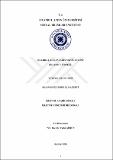JavaScript is disabled for your browser. Some features of this site may not work without it.
| dc.contributor.author | Elhaznevi, Muhammed Sabir
|
|
| dc.date.accessioned | 2019-05-24T13:13:31Z | |
| dc.date.available | 2019-05-24T13:13:31Z | |
| dc.date.issued | 2016 | |
| dc.identifier.uri | http://hdl.handle.net/11547/2117 | |
| dc.description.abstract | Kamu personel sistemindeki verimlilik arayışı son dönemde yeni kamu yönetimi anlayışı doğrultusunda kamu kesiminde yaşanan dönüşüm sürecinin önemli bir bileşeni olmuştur. Daha düşük maliyetle etkin ve kaliteli bir kamu hizmeti sunumu ile vatandaş memnuniyetinin aynı anda sağlanmasına yönelik sürecin kilit noktası olarak, sonuçlarına etkili kararlar bağlanmış bir performans değerlendirme sistemi düşüncesi ön plana çıkmıştır. Çalışanların performansının bireysel olarak değerlendirilmesi fikri; amaçları ve süreçleri itibarıyla özel sektörden ayrılan kamu kesimindeki birçok kısıt ve engele rağmen güncel bir konu olmaya devam etmektedir. Performans değerlendirme uygulamasının en temel yansıması ücret üzerine olmuş ve örneklerin birçoğunda ücret-performans arasında bir ilişki kurulması fikri ön plana çıkmıştır. Yalnızca ücretle ilişkilendirmenin ötesinde insan kaynaklarına yönelik birçok faaliyetle arasında bağ kurulabilecek olan performans değerlendirme sistemi, böylelikle ücret üzerine odaklanması yönüyle çalışma barışını tehdit ettiği yönündeki eleştirilerden de uzaklaşabilecektir. Bunun yanı sıra nesnel bir performans değerlendirme sisteminin uygulanabilirliğinin ortaya konulabilmesi için kamu kesiminde ölçülebilir ve sayısallaştırılabilir iş süreçlerinin olduğu kurum ve mesleklerden başlanarak denenmesi önem taşımaktadır. Bu çalışmanın amacı, etkin bir kamu performans değerlendirme sisteminde bulunması gereken bileşenleri analiz ederek elde edilen bilgiler ışığında sistemin hazırlık aşamasından işleyişine kadar öneriler geliştirmek ve Türkiye İş Kurumu (İŞKUR) bünyesinde görev yapan iş ve meslek danışmanlarına yönelik bir performans değerlendirme sistemi çerçevesi oluşturmaktır. Çalışmanın neticesinde İŞKUR’ un iş ve meslek danışmanlığı faaliyetlerine ilişkin sayısal bilgi ve veriler ortaya konularak çeşitli analizler yapıldıktan sonra kurum bünyesinde görev yapan iş ve meslek danışmanlarının performans değerlendirme sistemine ilişkin beklenti ve düşüncelerinin belirlenerek etkin bir sistem teşkil edilmesi amacıyla kapsamlı bir anket çalışması gerçekleştirilmiştir. Yapılan çalışma sonucunda, bireysel olarak performans ölçüm ve değerlendirme sistemine nispeten uygun olduğu gözlemlenen iş ve meslek danışmanları grubuna yönelik uygulama önerileri geliştirilmiştir. Bu kapsamda, danışmanlara yönelik gerçekleştirilen anketle performanslarının değerlendirilmesi fikrine bakış açıları ve İŞKUR’ un da üzerinde durduğu bu olası süreçten beklentileri tespit edilmiştir. Anket ve yapılan diğer araştırmalar da dikkate alınarak, sistemin ana unsurları olan değerlendirme yöntemi, performans kriterleri, değerlendirme periyodu, değerlendiriciler, ödüller ve sonuçlarla ilişkilendirilebilecek insan kaynakları faaliyetleri gibi konuları içeren bir çerçeve oluşturulmuştur. | tr_TR |
| dc.language.iso | tr | tr_TR |
| dc.publisher | İSTANBUL AYDIN ÜNİVERSİTESİ SOSYAL BİLİMLER ENSTİTÜSÜ | tr_TR |
| dc.subject | Motivasyon | tr_TR |
| dc.subject | Performans Değerlendirme Sistemi | tr_TR |
| dc.subject | Verimlilik | tr_TR |
| dc.subject | İş ve Meslek Danışmanlığı | tr_TR |
| dc.subject | İnsan Kaynakları | tr_TR |
| dc.subject | Motivation | tr_TR |
| dc.subject | Performance Evaluation System | tr_TR |
| dc.subject | Productivity | tr_TR |
| dc.subject | Job and Vocational Counselor | tr_TR |
| dc.subject | Human Resources | tr_TR |
| dc.title | İŞKURDA ÇALIŞANLARIN MOTİVASYONU | tr_TR |
| dc.type | Thesis | tr_TR |
| dc.description.abstractol | Seeking productivity at the civil servant system is an important component of transition process in public sector in line with new public management concept recently. P erformance evaluation system which has efficient decisions has come into prominence as a key point of the process of delivering efficient and quality public services with lower cost and enabling citizen satisfaction at the same time. Despite of several limitations and obstacles in the public sector which differs from private sector regarding aims and processes, the notion of evaluation of employees’ individual performances will continue to be an importatnt issue. The main reflection of the implementation of performance evaluation has been on the wages and most of the examples have set forth that a link should be set between wage and performance. Thus performance evaluation system which is able to make connections with the several human resources activities can eliminate the critics implying that the system focusing only wages, threatens the working labor peace. Besides it is important to start performance evaluation implementations on institutions that have measurable and numarable work processes in order to prove practicability of an objective performance evaluation system. The purpose of this study, to developing recommendations from preparation phase to operation in the light of the results of the analyses of the components that an effective performance evaluation system needs to have and to constitute a performance evaluation system template for job and vocational counselors who work at the Turkish Employment Agency (İŞKUR). As a result of the study, some digital statistics, data and analyses were shared about job and vocational consultancy activities and a comprehensive questionnaire was carried out among job and vocational counselors, for the purpose of determining their expectations and ideas relation to performance evaluation system and constituting an effective performance system. In this context, some implementation recommendations were developed for job and vocational counselors who were thought more convenient occupational group in order to individual performance measurement and evaluation system. Therefore, counselors’ perspectives and expectations about potential process which is worked on by İŞKUR were determined. A framework taking into account this questionnaire and other surveys and including the key elements such as evaluation method, performance criteria, evaluation period, evaluator, rewards and human resources activities that can be correlated conclusions were specified. | tr_TR |
| dc.publisher.firstpagenumber | 1 | tr_TR |
| dc.publisher.lastpagenumber | 88 | tr_TR |
Files in this item
This item appears in the following Collection(s)
-
Tezler -- Thesis [3470]
